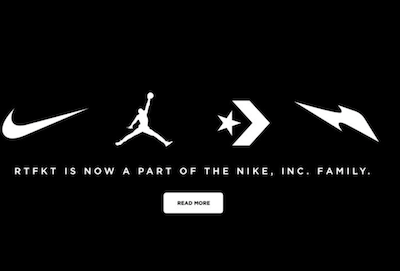Once upon a time, sprawling public companies ‘diworseified’ into vineyards and ill-capitalised finance divisions when they had too much money to spend.
But that’s soooo 1980s.
Now if you’re a leader of a big public company, the go-to move – and a great way to rile up anyone over 35-years old – is to purchase a digital assets start-up.
Only this morning a friend of mine (himself extremely tech savvy but on the wrong side of 45) rolled his eyes at news that Nike had just purchased an NFT collectibles studio for an undisclosed sum.
According to TechCrunch, the purchase of RTFKT:
… comes at an opportune time for the studio; RTFKT is currently behind one of the most talked-about NFT project drops of the month – a sweeping avatar partnership with artist Takashi Murakami called CloneX.
Since its initial drop less than three weeks ago, the project has already seen nearly $65 million in transaction volume according to crypto tracker CryptoSlam.
Terms of the acquisition were not disclosed. The startup raised an $8 million seed round back in May led by Andreessen Horowitz that valued the company at $33.3 million.
TechCrunch, 13 December 2021
My friend is dismayed by this direction of travel.
“I assumed at some point that shit would get real, even for Gen-Omicron!” he bemoaned.
Together in electric dreams
My friend is destined to a remaining lifetime of disappointment, at least on this front.
(The relative prospects for his hairline are more positive, if I recall his father’s head of hair correctly).
Because why would anybody expect “shit to become more real”?
Ever?
My first computer was a Sinclair ZX81. I whiled away hours making an asterisk jump over the character ‘A’, and programming the computers in WH Smiths to print OWAIN WAS HERE all down the screen.
How quickly we forget.
By 1991 I was chatting in real-time to computer science students in Hyderabad, India, via a multi-user text game.
Yet my father – an IT professional of two decades standing by that point – still couldn’t see why he’d ever need a non-work email address.
Today my girlfriend does all her work on Zoom and shops almost entirely online, while my friend’s kids pester him for v-bucks.
Needless to say my friend told me the latter by messaging on a smartphone.
We’re on a road to nowhere
The only direction of travel for humanity for the past 40 years has been more digital and more virtual and less ‘real’. (A term which will pretty soon become meaningless in this context.)
And technology can – as far as we’re aware – improve indefinitely, at least on human timescales.
Short of some great filter party-pooping, why would anyone expect this trend to reverse?
Extrapolating, our future will eventually mostly be ‘unreal’. All that’s up for debate is the timeframe.
In that context, Nike buying an NFT collectible studio is hardly something to roll your eyes at – unless you question its timing.
Especially as we don’t know the price.
Given the publicity generated by irate Boomers swapping links to the news story, this kind of acquisition might even pay for itself in PR terms right now.
Keep on (make) believing
Of course knowing the price often makes things worse when it comes to evaluating the NFT space.
I’ve found that people who rail against a $11.75 million cryptopunk by ranting about the spurious ephemeral nature of NFTs don’t put up too much protest if you ask them how they’d feel if the same cryptopunk cost $11.75 (and no millions!)
Their complaint is not really about the technology. It’s sticker shock at the pricing.
Understandable. I can’t imagine many of today’s blockbuster NFTs will keep their value long-term, either.
And by the same token (boom boom), most of the bullish mania around blockchain is driven by insane high prices, too.
I’d guesstimate that 99% of crypto-owners wouldn’t be owners if a Bitcoin still cost $0.001, for instance.
And that includes me.
But none of this price discussion says anything about whether NFTs – unique digital assets – are an important technology with a big future.
You might not fancy sporting your own unique digital sneakers in a game like Fortnite. But your grandkids won’t think twice.
In our mostly virtual destiny, do you agree scarce and unique assets would have more value than commodities that are infinitely replicable?
You do?
(Because how could they not? Even if only by a little bit).
Then congratulations, you’re also an NFT believer. You can stop being so angry now.
